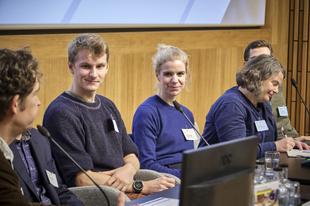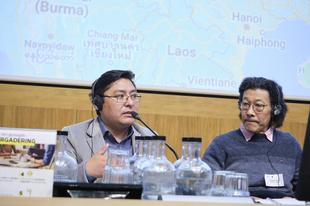Electronics Watch conference unites worker and buyer perspectives to advance due diligence in global supply chains
On November 6-7, 2024, Electronics Watch hosted its sixth Annual Conference in Brussels, Belgium. The conference brought together 118 participants from 75 organisations across 27 countries. Discussions explored stakeholder collaboration within the context of human rights due diligence with a focus on protecting the rights of workers.
Key themes from the public sessions
The conference opened with a public session on the evolving regulatory landscape. The expert panel, which included representatives from industry and a trade union federation, public authorities, and a worker rights organisation, considered the potential impact of recent legislation on rightsholders in in global supply chains. Key themes included the transposition of European legislation into national law, capacity-building needs, and the importance of distributing costs and risks across the supply chain, protecting the rights of workers.
The second panel zoomed in on accountability for business harms in global supply chains. Worker rights advocates from China, Taiwan, Bolivia, and Hungary presented examples of worker exploitation affecting vulnerable groups, like migrant workers, explained challenges to enforcing labour laws in informal and cooperative mining operations, and pointed to current gaps in due diligence implementation. These accounts showed how the responsibility to provide evidence of harm often falls on rightsholders, rather than those causing the harm having the responsibility to prove no harm was caused.
The morning culminated in a networking lunch, where attendees had the opportunity to connect, exchange ideas, and explore potential collaborations.
Strengthening collaboration and shared learning
Following the public sessions, Electronics Watch convened closed sessions for its network of affiliates, monitoring partners, board members, and staff. Participants exchanged perspectives, shared updates, and discussed challenges to their respective efforts to uphold workers' rights using public procurement leverage. Interactive workshops and a simulation game allowed participants to empathise with one another and understand different groups' contributions to the Electronics Watch impact model. These sessions also created a basis for identifying opportunities to improve the quality and impact of current collaborations, including by balancing case-based remediation with more systemic change initiatives.
Thanks to hosts, speakers and participants
We would like to thank the Flemish Agency for Facility Operations (Het Facilitair Bedrijf) and the Flemish Government for their generous support in co-hosting the event. Our gratitude also goes to all the speakers for their valuable contributions, and to participants for their active engagement and insights throughout the conference.
To see more photos from the conference, visit our Flickr albums here and here.





